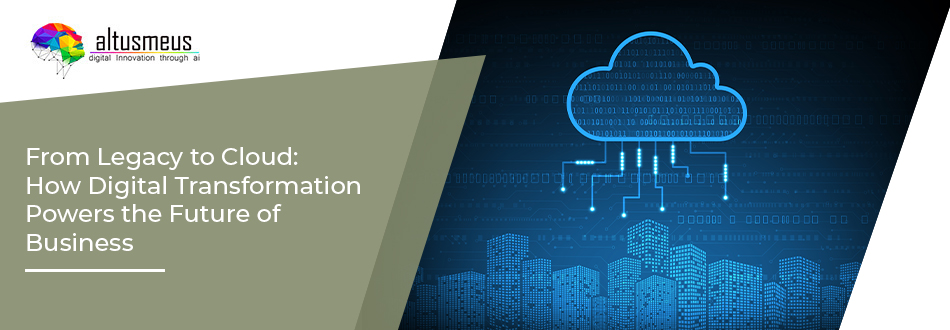Ten to twenty years ago, most businesses depended on legacy systems, the traditional software and hardware that powered everything from payroll to customer databases. For their time, these systems were impressive. A bank’s mainframe could process thousands of daily transactions reliably, while a retailer’s point-of-sale system was enough to handle everyday customer purchases.
But business has changed. Customers now shop online at midnight, order groceries through an app, or expect same-day delivery with real-time tracking. They want services that are instant, personalized, and available across devices. Legacy systems, designed for a slower and less connected world, can’t keep up with these demands. They’re often expensive to maintain, hard to update, and limited in flexibility.
This is where cloud computing comes in, the foundation of modern digital transformation. The cloud refers to storing and accessing data, software, and services over the internet instead of relying solely on local servers or hardware. In simple terms, instead of businesses owning bulky, costly IT infrastructure, they can “rent” computing power and storage on demand, just like paying for electricity or water.
Cloud is not just a shift in technology, it’s a shift in how businesses think, operate, and grow.
What is Digital Transformation, and Why Cloud Matters
Digital transformation is the process of using technology to fundamentally improve how an organization operates and delivers value to its customers. It’s not just about buying new software, it’s about reimagining business models, customer experiences, and internal processes.
The cloud is central to this transformation because it provides the flexibility, speed, and scalability that legacy systems cannot.
How Cloud is Transforming Business
1. Flexibility and Scalability
With legacy systems, businesses had to buy expensive servers upfront, even if they weren’t fully used most of the time. Cloud computing changes this. A company can scale its resources up or down instantly. For example, an online ticketing platform can handle a sudden rush of customers during a concert release without crashing.
2. Cost Savings
Cloud works on a pay-as-you-go model. Instead of spending heavily on equipment and IT staff to maintain it, businesses only pay for what they use. This frees up capital to invest in innovation, product development, or customer service.
3. Remote Access and Collaboration
In the past, employees needed to be in the office to access company systems. With cloud, teams can securely work from anywhere, whether it’s a remote employee logging in from another country or sales staff accessing data on the go. This became especially vital during the Covid-19 pandemic.
4. Data and Analytics
One of the most powerful aspects of digital transformation is using data to make decisions. Cloud platforms allow businesses to collect, analyze, and act on data in real time. A retailer, for instance, can track which products are selling best in different regions and adjust inventory instantly.
5. Security and Reliability
There’s a misconception that cloud is less secure than on-premise systems. In reality, top cloud providers invest heavily in encryption, compliance, and disaster recovery, far more than most individual companies could manage with legacy setups.
Benefits Beyond Technology
Cloud adoption goes beyond IT, it impacts every aspect of business:
- Faster Innovation – Launch new products and services without waiting months for system upgrades.
- Customer Experience – Offer faster, more personalized, always-available services.
- Resilience – Protect operations with built-in disaster recovery.
- Global Reach – Expand to new markets without building costly infrastructure.
This is the true promise of digital transformation: not just improving systems, but preparing businesses for a future that is agile, competitive, and customer-focused.
How AltusMeus Can Help
Moving from legacy to cloud can feel overwhelming, especially for organizations with decades of existing systems. This is where AltusMeus plays a key role. We guide businesses through every step of their digital transformation journey:
- Assessing current legacy systems.
- Designing secure and scalable cloud solutions.
- Ensuring smooth migration with minimal disruption.
- Providing ongoing support to maximize the value of cloud investments.
AltusMeus doesn’t just move your systems to the cloud, we help you unlock new opportunities, reduce costs, and future-proof your business.
Conclusion
Legacy systems had their place in the past, but in today’s fast-paced digital economy, they hold businesses back. Customers expect speed, personalization, and convenience, and only cloud-powered digital transformation can deliver at scale.
The future of business is in the cloud: more flexible, more data-driven, and more innovative. Companies that embrace this shift will not only survive but thrive. With AltusMeus as a trusted partner, the journey from legacy to cloud becomes a stepping stone to growth, resilience, and long-term success.




